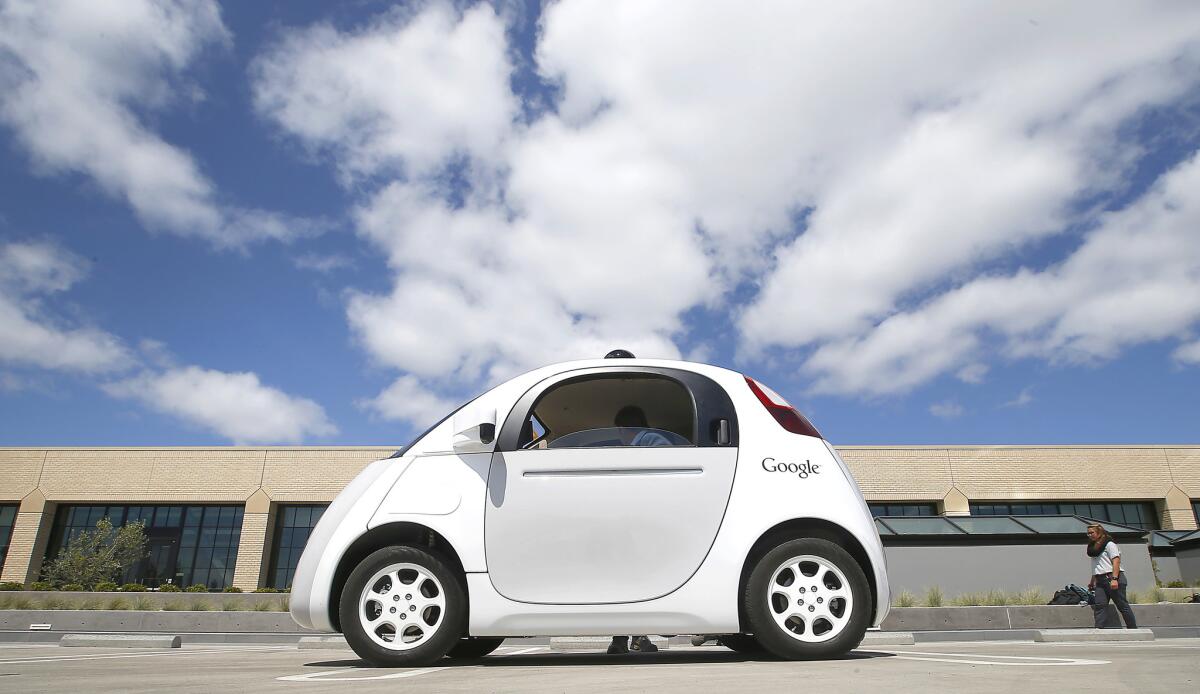Passenger bus teaches Google robot car a lesson

Google’s self-driving prototype car is presented at the company’s campus in Mountain View, Calif., in May 2015.
- Share via
When it comes to hair-raising traffic duels, most California motorists know better than to play chicken with a hulking passenger bus.
This, however, is not a concept widely understood by Google’s fleet of fearless autonomous cars.
Following a Valentine’s Day collision between a bus and an autonomous car in Silicon Valley, Google engineers have reportedly refined the vehicle’s software to better “understand” the sometimes bullying nature of public transportation.
The incident has provided new ammunition to critics of autonomous vehicles. On Monday, the group Consumer Watchdog issued a statement saying the collision highlighted the need for stricter oversight of the technology.
“This accident is more proof that robot car technology is not ready for auto pilot and a human driver needs to be able to take over when something goes wrong,” said the group’s privacy project director, John M. Simpson. “The police should be called to the site of every robot car crash and all technical data and video associated with the accident must be made public.”
An accident report submitted to the DMV explains the Mountain View, Calif., collision this way:
The Google car, 2012 Lexus RX450h, was eastbound in the far right lane of El Camino Real and prepared to make a right turn onto Castro Street by pulling close to the right curb.
But the Google car encountered an unexpected problem, according to the report – there were sandbags around a manhole in its path. The obstruction forced the vehicle to weave left, back toward the center of the lane, before it could turn right onto Castro Street.
After letting a few cars pass, the car prepared to move left and forward around the bags, then make its turn. The bus was approaching from behind and could be seen in the left mirror, the accident report notes.
“The Google [car] test driver saw the bus approaching in the left side mirror but believed the bus would stop or slow to allow the Google [car] to continue,” the report stated.
The bus did neither.
The Google car collided with the bus, damaging the car’s left front fender, left front wheel and one of its driver’s-side sensors, the report said. No injuries were reported.
“We can imagine the bus driver assumed we were going to stay put. Unfortunately, all these assumptions led us to the same spot in the lane at the same time,” Google said in its February monthly report. “This type of misunderstanding happens between human drivers on the road every day.
“This is a classic example of the negotiation that’s a normal part of driving -- we’re all trying to predict each other’s movements. In this case, we clearly bear some responsibility, because if our car hadn’t moved there wouldn’t have been a collision. That said, our test driver believed the bus was going to slow or stop to allow us to merge into the traffic, and that there would be sufficient space to do that.”
The collision wasn’t the first for Google’s autonomous vehicles. The company’s cars have been in a handful of collisions over the last few years, records show. Its cars have also been pulled over by police.
Google said it refined its software since the crash and now the cars “more deeply understand” that buses and other large vehicles are less likely to yield, a lesson drivers in L.A. and elsewhere are reminded of every day.
See more of our top stories on Facebook >>
For breaking California news, follow @JosephSerna.
ALSO
Deadly street racing fueled by social media, popular culture, police say
One man still wanted by police in KKK rally stabbings at Anaheim park
Mountain High ski area is closing until it gets new snow
More to Read
Sign up for Essential California
The most important California stories and recommendations in your inbox every morning.
You may occasionally receive promotional content from the Los Angeles Times.














